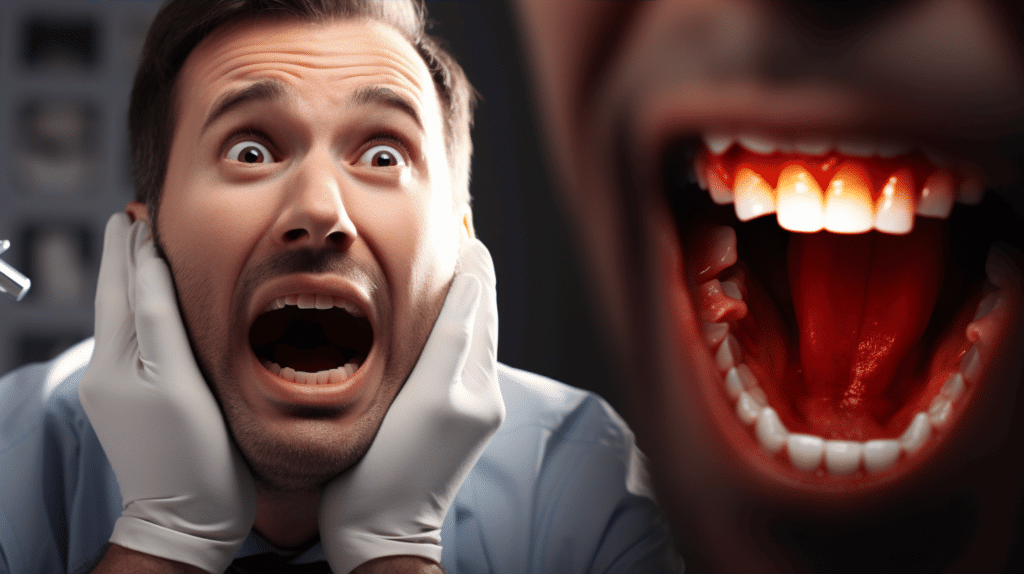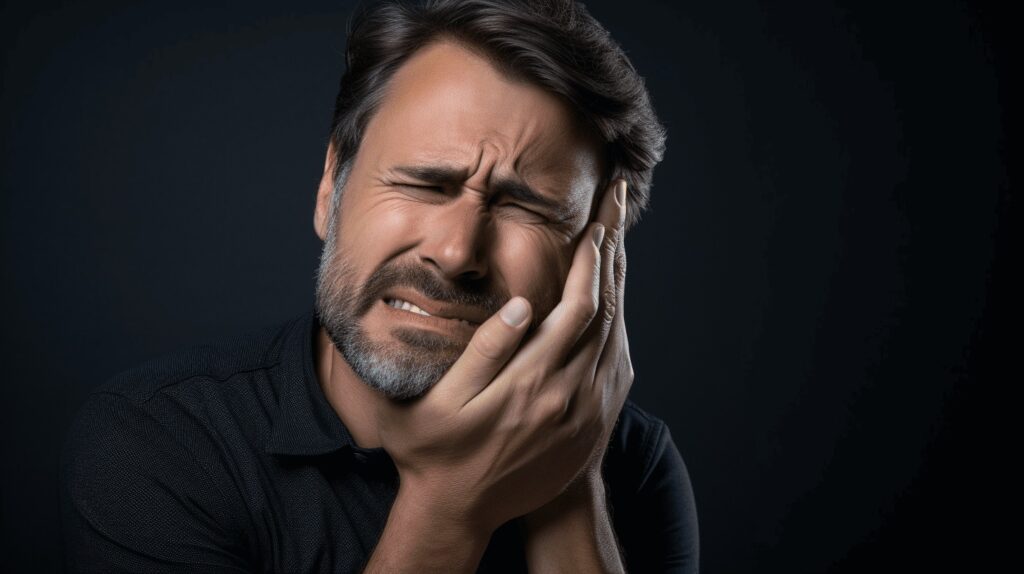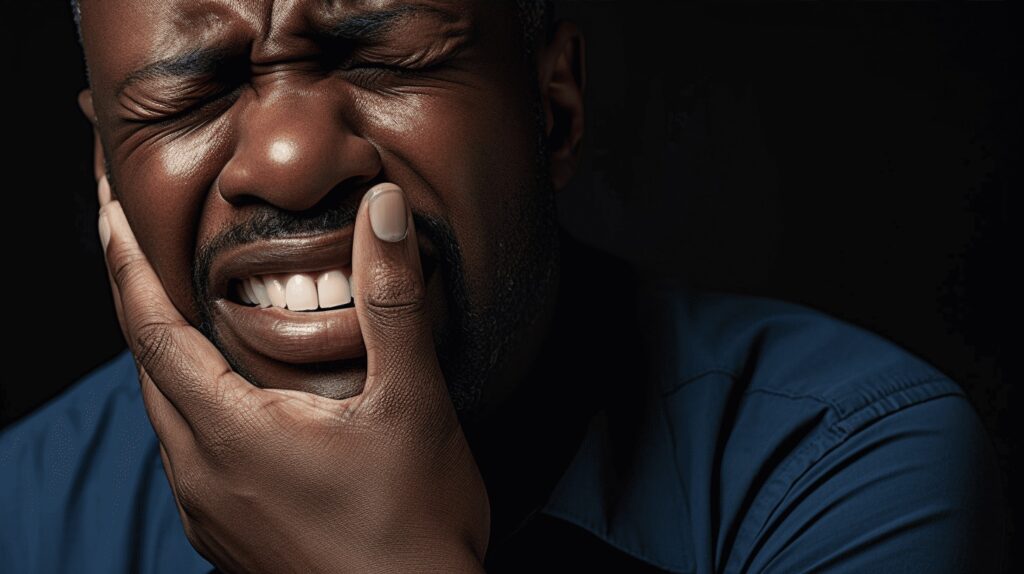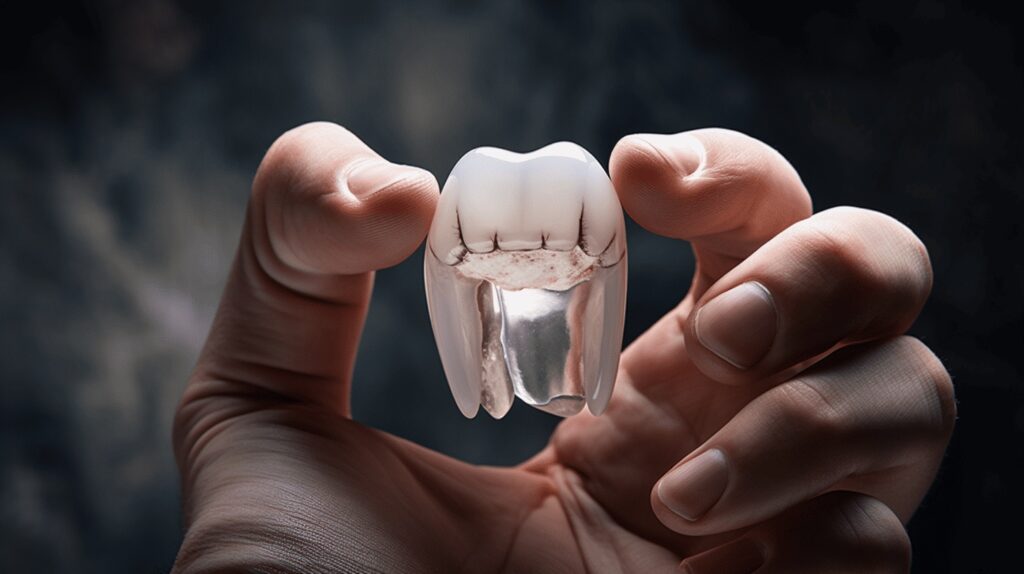Imagine it’s the weekend! You’re out having fun with friends, maybe at a soccer game or enjoying a hearty laugh over a dinner conversation. Suddenly there’s this intense, throbbing pain in your mouth that sends your spirits plummeting. What would you do? 😨 This is where emergency dental care comes into play.
In a world that’s constantly in motion, unforeseen situations can happen at any time🤷. A fall, a sudden ache, or a cracked tooth while gnawing on your favorite snack – such incidents don’t wait for working hours. And neither should you when it comes to dental health.
When sudden dental disasters strike, emergency dental care becomes the unsung hero. It can help alleviate your pain, save your tooth, prevent further damage and potentially save you from undergoing complex dental procedures in the future. What’s more, it can also help prevent dental emergencies in the first place with the right advice.
Just as you wouldn’t ignore a sudden chest pain, an inexplicable toothache should also be taken seriously. In this article, we delve into what constitutes emergency dental care, common dental emergencies, when you should seek this care, and how it can come to your rescue. For anyone who’s ever experienced a sudden toothache in the dead of the night or a broken tooth at a party, this one’s for you! 🚑🦷
Table of Contents
What is Emergency Dental Care?
It’s a sunny afternoon, and you’re enjoying a scoop of your favorite ice cream. Suddenly, you feel a sharp jolt of pain in your tooth – a sign of dental havoc! Fret not, my friend, because what you need is emergency dental care, and we’re here to enlighten you about it.
Emergency dental care is immediate treatment provided by dental professionals to alleviate severe oral pain and potentially avoid serious complications. Some common scenarios that require emergency dental care include:
- Severe toothache
- Broken or knocked-out tooth
- Lost dental filling or dental crown
- Swelling or knots on the gums
- Techniques to alleviate severe tooth sensitivity
These unexpected dental troubles can hit any time of the day, or night, so it’s crucial to get them treated promptly to prevent further damage to our precious pearly whites.
The beauty of emergency dental care lies in its prompt availability and immediate relief. Remember, a toothache at 2 a.m. is just as important as a regular dental check-up at 2 p.m. To make life easier for you, many dental clinics offer 24/7 emergency services.
In addition to providing relief, emergency dental care can turn out to be a tooth-saver. An immediate response can help save a tooth, especially in the case of a knocked-out tooth. We know it’s scary, but trust us, with proper emergency dental care, even the fiercest of dental problems can be tamed.
We hope this gives you a better understanding of what emergency dental care is all about. Don’t let dental ailments overthrow your smile, grip them in the bud with help of emergency dental care. Remember: Your teeth are meant to last a lifetime, so take good care of them! Now, you can confidently enjoy that delicious scoop of ice cream without any worry. 🍦👌🏻
Common Dental Emergencies
Dental emergencies can happen at any time, leaving you in agonizing pain and discomfort. But don’t worry, we’re here to help you understand these emergencies and ensure you’re well-prepared should they ever occur. In this section, we’ll skim through five common dental emergencies, their symptoms, and simple at-home remedies to provide temporary relief until you can see your dentist. 🦷
Toothache
Oh, the dreaded toothache! It’s by far one of the most common dental emergencies. Toothaches are caused by various factors such as cavities, gum disease, an exposed tooth root, or even ear and sinus infections. The pain can range from mild to very severe and is often accompanied by swelling around the tooth.
- To alleviate the pain, rinse your mouth with warm water.
- Gently use dental floss to remove any lodged food.
- If swelling is evident, apply a cold compress to your cheek. Never put heat against your skin.
Broken or Chipped Tooth
A little tumble or biting into hard food can sometimes lead to a chipped or broken tooth, and the pain can be quite excruciating, especially if the nerve inside the tooth is exposed.
- Rinse your mouth with warm water to clean the area.
- Use a cold press against your cheek to reduce swelling.
Lost Dental Filling or Crown
Fillings and crowns can sometimes fall out, leaving your tooth exposed and sensitive.
- To remedy this, you could apply a little clove oil to the sensitive area using a cotton swab.
- Over-the-counter dental cement can also protect the area until you can see your dentist.
Tooth Abscess
An abscess occurs when there’s an infection at the root of your tooth or between your tooth and gum. This condition is a serious health threat and can even be life-threatening if left untreated. It’s marked by throbbing pain, red gums, bad taste in your mouth, fever, and swelling in your face or cheek.
- Rinse your mouth with a mild saltwater solution (half a teaspoon of salt in 8 ounces of water) several times a day.
Knocked-Out Tooth
While it’s not as frequent, a knocked-out tooth is indeed a critical dental emergency. Immediate care is crucial to save the tooth.
- Try to put the tooth back in its socket without touching the root.
- If that’s not possible, place the tooth in a container of milk and head to your dentist straightaway.
Remember, these remedies are only temporary solutions. If you ever face a dental emergency, make sure to see your dentist as soon as possible. Their expertise is essential for alleviating pain, preventing further complications, and maintaining your perfect smile. 😊
When to Contact an Emergency Dentist
Given our hectic lifestyles and, sometimes, our affinity for procrastination, minor dental problems can often slip under the radar. However, when pain or discomfort levels reach their peak, it becomes crucial to distinguish between situations that require immediate attention and those that can wait till your next dental appointment.
In this section, we’ll serve as your guide – answering questions on when exactly it’s time to dial up your emergency dentist. So, brace yourself and let’s dive right in!🙂
Signs Indicating Need for Emergency Dental Care
Dental issues seldom announce their arrival. They might sneak in as a slight discomfort but swiftly escalate into an emergency if not attended to on time. Here are some signs you should never ignore:
- Severe toothache: If the pain is unbearable or persistent, it indicates a serious issue.
- Swollen, tender, or bleeding gums: These could be signs of gum disease or infection.
- Loose tooth: Adults should not experience loose teeth; it could signify a tooth injury.
- Mouth sores or bubbles: Unhealed sores, especially with accompanied fever, could point to a bacterial infection.
This list is by no means complete. Remember, when in doubt, it’s better to be safe than sorry. The smallest signs can sometimes forecast the biggest problems.
Immediate Response for Dental Emergencies
Just confirmed that you’re in the middle of a dental emergency? Don’t despair! Stay calm and give your emergency dentist a call right away. Then, follow these tips:
- Rinse your mouth with warm saltwater to relieve pain.
- Use a cold compress to manage any swelling or inflammation.
- Try flossing gently if an object is stuck between your teeth.
Your quick action can potentially minimize damage and expedite healing time.
Distinguishing Between a Dental Emergency and Non-Emergency
When you’re in pain, every dental issue can feel like an emergency. However, not all of them are. So, how do you tell the difference? Here’s a key differentiation point:
- Dental Emergencies: These need immediate attention and include severe pain, lost or broken tooth, jaw injuries, or signs of infection.
- Non-Emergencies: These can typically wait a couple of days, like a minor toothache, lost filling, dull tooth pain, or a broken retainer.
However, if your symptoms persist or get worse, don’t hesitate to reach out to your dentist.
Remember, dental emergencies are serious and should never be ignored. They can cause lasting issues if not immediately addressed. So, keep pain levels, persistence, and the nature of your discomfort in mind to make the right call when in a dental fix!
How Emergency Dental Care Can Save You
Headaches, sleepless nights, and relentless aching can all be symptoms of a severe dental issue waiting to explode. When jaws ache and teeth throb, we understand that waiting for a regular dentist’s appointment seems impossible. Our emergency dental care comes to the rescue in scenarios like these. 😰
Let’s delve deeper into how these prompt interventions can literally ‘save’ you!
Immediate Pain Relief
One of the biggest benefits of emergency dental care is immediate pain relief. Oral discomfort can be excruciating, and sometimes, over-the-counter medications might not do the trick. When you seek emergency dental assistance, the professionals:
- Administer suitable and immediate analgesics to alleviate your discomfort.
- Prescribe further medication to manage pain at home.
- Give sound advice to prevent discomfort from recurring.
In all, emergency dental care acts as your first line of defense against unbearable oral pain.
Prevent Further Damage and Infection
We hope nobody experiences this, but a knocked-out tooth or broken braces can escalate to severe issues if not addressed immediately. It’s more than about preserving your lovely smile—these problems could lead to:
- Infections caused by exposed wounds.
- Further tooth damage.
- Complications involving other teeth.
- Worsened oral health.
By seeking emergency dental care at the right time, you can prevent these complications, ensuring your dental wellbeing.
Save Your Tooth
Would it surprise you if we tell you that a knocked-out tooth could be saved? Yes, you read it right! If you bring the tooth to us within an hour of it being knocked out, there’s a high chance that we may be able to reinsert it back to its socket. Prompt emergency dental care can indeed perform wonders! 🙌
Prevent Complex Dental Procedures in Future
A stitch in time saves nine—they weren’t kidding when they said this. Attending to emergency dental issues at the earliest helps avoid costly and complex dental procedures in the future. Some benefits include:
- Early detection and treatment of oral diseases.
- Prevention of the need for surgery or other invasive procedures.
- Cost savings in the long run.
We’ve understood how vital emergency dental care is. The next time you hear your friend dismissing a dental issue as trivial, remind them of its dangerous trail. Or better yet, deliver this valuable knowledge to all your loved ones. After all, being proactive about dental emergencies is just as important as any other medical emergency. 😇
The lack of emphasis on emergency dental care has made it the unsung hero of dental health. Do know that it could potentially save you from severe problems down the road. Don’t hesitate to reach out to us for your emergency dental needs. We’re here to help – because nothing should come between you and your brightest smile! 😊
Prevention of Dental Emergencies
Taking care of your smile is more than just battling bad breath or preventing cavities. In fact, safeguarding your dental health can play a significant role in avoiding dental emergencies. 🚨 From unexpected toothaches and chipped teeth to sudden infections, undesired dental surprises can potentially disrupt your everyday life and damage your oral health! 😱 But hey, do not fret! 👍 We have some excellent tips to help you prevent these dental emergencies.
Regular Dental Check-Ups
Visiting your dentist should be as habitual as your morning cup of coffee! 🦷☕ Regular dental check-ups are key to maintaining a healthy, strong, and shining smile. Plus, they allow your dentist to identify early signs of potential problems, such as cavities, gum diseases, or abnormal growths. Consider these points;
- Early diagnosis helps prevent more serious dental health problems.
- On average, patients should have a dental check-up every 6 months.
- Your dentist may suggest additional preventive treatments, including sealants, if they identify you’re at a higher risk of cavities.
Remember, avoiding the dentist often leads to quick dental deterioration and before you know it, voila! You are smack in the middle of a dental emergency. In this context, prevention definitely proves to be better (and less painful) than cure.
Use of Protective Gear
If you lead an active lifestyle or participate in sports, oral injuries are a real risk. 😨 But guess what? This risk can certainly be minimized through the use of the right protective gear. Some key takeaways include;
- Wearing a mouth guard while participating in contact sports.
- Using a night guard if you’re prone to grinding your teeth during sleep.
- Opting for a full-face helmet whenever you engage in activities such as bike riding, rollerblading, or skateboarding.
“Take care of your teeth and they will take care of you.” We couldn’t agree more with this age-old wisdom! Ensuring the use of the right protective gear not only shores up your defense against unforeseen dental emergencies but also adds years of health to your teeth. 👍
Healthy Dental Habits – Emergency Dental Care
In our journey to prevent dental emergencies, one simple fact stands out: Your daily routines can make a difference—no magic wand required! 😉 Here’s how you can keep your dental health in check;
- Clean teeth daily: Brush at least twice a day and floss once daily.
- Use fluoridated toothpaste which helps harden tooth enamel and reduces the risk of decay.
- Avoid sugary foods and drinks that encourage the growth of tooth decay-causing bacteria.
- Refrain from using your teeth as tools (for instance, to open bottle caps).
In summary, developing and sticking to healthy dental habits can move the needle in preventing potential dental mishaps and emergencies. After all, every tooth in a person’s mouth is more valuable than a diamond. ✨ Promise us you’ll take good care of yours!
Conclusion – Emergency Dental Care
Dental emergencies can catch us off-guard, but knowing how to respond is invaluable and can significantly impact the final results. From recognizing the signs of a dental emergency to understanding the crucial steps to take, being prepared means you won’t have to deal with additional, preventable pain or damage.
Not all dental issues qualify as emergencies, yet they shouldn’t go unchecked. Regular check-ups, maintaining good dental habits, and protective measures can help avoid unnecessary complications. On the other hand, when emergencies do happen, it’s reassuring to know that Wilshire Smile Studio’s team of experienced professionals offer outstanding emergency dental care anytime you need it.
The unpredictability of dental emergencies reinforces the importance of having a trustworthy dental care provider as part of your ‘healthcare family.’ At Wilshire Smile Studio, we provide a comfortable and welcoming environment equipped with cutting-edge technology to ensure the best experience for our patients. Not only do we provide immediate emergency care, but we also emphasize preventative measures and education to help you maintain that perfect, healthy smile.
Remember, your dental health is a crucial part of your overall well-being—don’t put it on the back burner. Whether you’re dealing with an unexpected toothache or scheduling your regular dental check-up, we are here, ready and waiting to cater to your dental needs. Stay safe, and keep smiling!
Book your free consultation with us online or call (323) DENTIST (323-336-8478) today.
Frequently Asked Questions – Emergency Dental Care
1. What is emergency dental care?
Emergency dental care refers to the immediate treatment provided by a dentist in situations where prompt attention is required to relieve severe pain, stop bleeding, repair broken teeth, or resolve any other dental issues that cannot wait for a regular appointment.
2. What are some common dental emergencies?
Some common dental emergencies include severe toothache, knocked-out tooth, broken or chipped tooth, loose or lost dental crown, gum abscess, and facial swelling or bleeding.
3. When should I seek emergency dental care?
You should seek emergency dental care if you experience intense tooth pain, have a knocked-out or broken tooth, suffer from severe gum swelling or bleeding, or encounter any other dental issue that requires immediate attention.
4. Where can I find emergency dental care services?
You can find emergency dental care services by contacting your regular dentist and inquiring about their availability for urgent cases. Alternatively, you can search for emergency dentists in your area or contact a local dental helpline for guidance.
5. How can emergency dental care save me in unforeseen situations?
Emergency dental care can save you in unforeseen situations by providing immediate relief from severe dental pain, preventing further damage to your teeth and gums, and ensuring timely treatment to avoid complications or infections.









